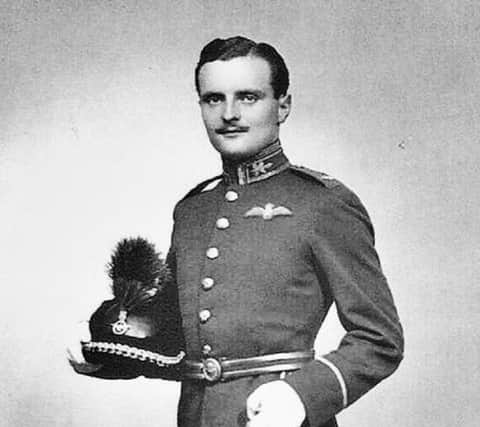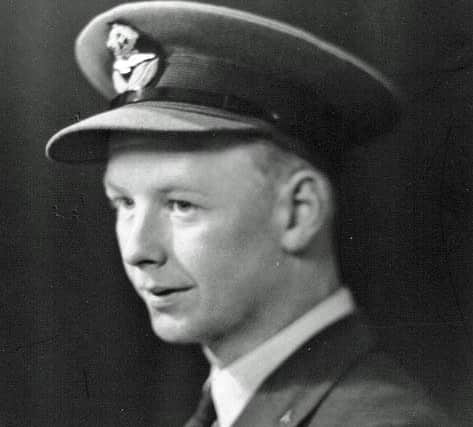Tributes to Scots reservists who fought in Battle of Britain


Now, eighty years on from the Battle of Britain, the Royal Auxiliary Air Force has paid tribute to two Scottish reservists who helped secure a crucial early victory in the conflict.
Archie McKellar and Robert Findlay Boyd, who flew in the spare time prior to war breaking out, proved themselves among the country’s most prolific and deadly pilots.
Advertisement
Hide AdAdvertisement
Hide AdBetween them, the two men shot down more than 30 German aircraft during the four month long battle for air supremacy in the skies of Britain.


McKellar, who worked as a plasterer at his father’s construction firm in Paisley, holds the record of shooting down the first German aircraft to advance on Britain, having trained his fire on a Heinkel HE-111 Bomber over Humbie, near Edinburgh.
The former pupil of Glasgow’s Shawlands Academy shot down a total of 21 aircraft, and achieved fame among pilots for his feats on 7 October 1940, when he downed five Messerschmitt Bf 109 fighters.
It earned him the unofficial honor of being an ‘ace in a day’, a rare commendation achieved by just four other RAF pilots during the Battle of Britain.
The Hurricane pilot also shot down three HE-111 bombers which were raiding Tyneside on a single day in August that year, an act for which he was awarded the Distinguished Flying Cross (DFC) for "outstanding leadership and courage".
Boyd, a reservist with (No 602) City of Glasgow Squadron in the Auxiliary Air Force who learnt to fly at weekends, engaged an enemy Stuka which was attacking RAF Tangmere.
The Spitfire pilot, from East Kilbride, began firing before his undercarriage had folded away, but less than a minute after taking off, he had forced the German aircraft to crash.
Boyd, whose prowess meant that he secured the fastest RAF victory of the entire war, shot down a total of 12 enemy aircraft over the summer and autumn of 1940.
Advertisement
Hide AdAdvertisement
Hide AdHe was awarded the DFC on 24 September 1940 and a Bar on 25 October 1940. His citation told of his: "Cool judgment and a keen desire to engage the enemy irrespective of the odds against him".
As part of ongoing commemorations marking the 80th anniversary of the conflict, one of the Royal Auxiliary Air Force’s most senior officers said McKellar and Boyd continued to inspire reservists several generations down the line.
Group Captain Gavin Hellard, inspector of the force, said: "These volunteer reservists represent the best of the ethos that the Royal Auxiliary Air Force still shows.
“They laid the foundation for today's RAF reservists who serve with equal commitment and dedication all over the world."
After the war, Boyd went on to fly charter flights for the long-defunct Scottish Aviation, and later became a farmer before moving to Skye.
He became a fixture of island life, and worked as the landlord of the Ferry Inn at Uig. He died suddenly in 1975 aged 59.
An even more tragic fate befell McKellar. On 1 November 1940, the day after the Battle of Britain officially came to an end, he was battling a formation of German fighters over Kent when he was shot down and killed. He was just 28. The Scot was posthumously awarded a Distinguished Service Order.
Sir Archibald Sinclair, the then secretary of state for air, said of McKellar: “When I met this little Scot, I recognised in him the qualities of a leader of men. His squadron would have followed him anywhere.”
Advertisement
Hide AdAdvertisement
Hide AdReservists like McKellar and Boyd made a sizeable contribution to the Battle of Britain. More than a third of the 2,946 men who flew in the battle were non-commissioned officers.
A message from the Editor:
Thank you for reading this story on our website. While I have your attention, I also have an important request to make of you.
The dramatic events of 2020 are having a major impact on many of our advertisers - and consequently the revenue we receive. We are now more reliant than ever on you taking out a digital subscription to support our journalism.
Subscribe to scotsman.com and enjoy unlimited access to Scottish news and information online and on our app. Visit https://www.scotsman.com/subscriptions now to sign up.
By supporting us, we are able to support you in providing trusted, fact-checked content for this website.
Joy Yates
Editorial Director
Comments
Want to join the conversation? Please or to comment on this article.